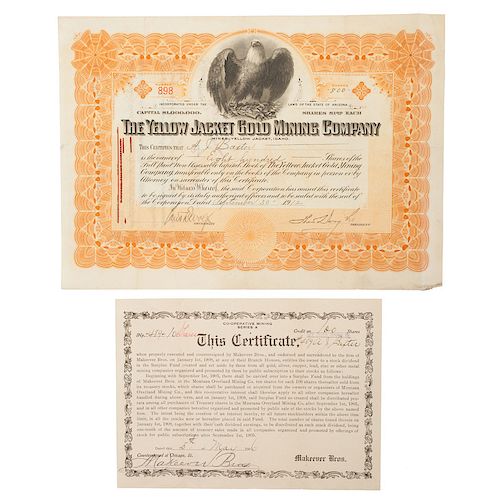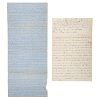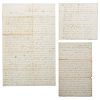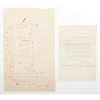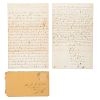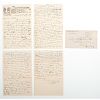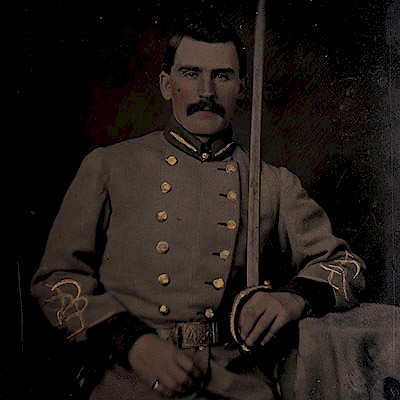Charles Baxter, 27th New Jersey Volunteers, Civil War Archive, Plus
About Seller
6270 Este Ave.
Cincinnati , OH 45232
United States
With offices in Cincinnati, Cleveland and Denver, Cowan’s holds over 40 auctions each year, with annual sales exceeding $16M. We reach buyers around the globe, and take pride in our reputation for integrity, customer service and great results. A full-service house, Cowan’s Auctions specializes in Am...Read more
Two ways to bid:
- Leave a max absentee bid and the platform will bid on your behalf up to your maximum bid during the live auction.
- Bid live during the auction and your bids will be submitted real-time to the auctioneer.
Bid Increments
| Price | Bid Increment |
|---|---|
| $0 | $25 |
| $500 | $50 |
| $1,000 | $100 |
| $2,000 | $250 |
| $5,000 | $500 |
| $10,000 | $1,000 |
| $20,000 | $2,500 |
| $50,000 | $5,000 |
| $100,000 | $10,000 |
About Auction
Jun 22, 2018
Cowan’s American History: Premier Auction, scheduled for June 22, 2018 is comprised of early photographs, documents, manuscripts, broadsides, flags, and more dating from the Revolutionary War, the Civil War, Late Indian Wars, World War I and II and beyond. Cowan's Auctions dawnie@cowans.com
- Lot Description
Lot of 80+ letters and dozens more documents relating to the Baxter family of New Jersey and descendants, including 30 letters written by Sergeant Charles J. Baxter during his enlistment with the New Jersey 27th Volunteer Infantry (1862-1863), another 5 letters written after his service but during the late stages of the war, plus several additional war-date documents. Baxter's war-date letters include references to Fredericksburg, Lincoln's 1864 re-election, and Jefferson Davis.
Charles John Baxter (1842-1911) was born in Vernon, NJ, the eldest of nine children born to John C. Baxter and Mary Jane Elston Baxter. His father was a farmer whose earliest ancestors had emigrated to the United States before the Revolution. Charles enlisted as a sergeant for nine months service on September 5, 1862, and on September 19, 1862, mustered into "F" Co. NJ 27th Infantry. He was mustered out on July 2, 1863, at Newark, NJ. Baxter's war-date letters are predominantly written to his family, with special notes for his siblings with whom he shares an affectionate relationship. Writing to his school age siblings, Charles says, "Remember the old adage Learn before you get old as learning is better than silver and gold." His well-written letters give testament to the fact that he is an educated and articulate young man, while offering a detailed portrait of his service.
The first letter in this collection is dated August 5, 1862, and is from Charles to his "Dear Parents, Brothers & Sisters." Charles has arrived in Newton, NJ, to enlist, and along with his companions is ready to enter the conflict. "We have been the most of the time this forenoon being examined & sworn in & are now in reality Soldiers of the United States army...the time has come & the boys are ready to start to Camp." Camp Frelinghuyson, near Newark, was the next destination for Baxter and the 27th, and he writes several letters from Camp prior to departing for Washington, DC on October 9th. In DC, the 27th was attached to the 2nd brigade, with Casey's Division, Defenses of Washington, DC, where it would stay through December.
Upon arrival in DC, Baxter and his regiment are first appointed in a temporary camp at East Capitol Hill, and his letters remark upon the majesty of the city and in particular the Capitol Building. Writing from Camp Kearney on October 23, 1862, Baxter continues to be filled with a sense of purpose so characteristic of new soldiers yet also begins to demonstrate a tinge of nostalgia: "We had a splendid address from a Vermont chaplain (I suppose I mean sermon) which was characterized by a great deal of patriotism, He said there were those among the green hills of Vermont & NJ that expected noble things of us & he entreated us to add honor to that already won by the soldiers of these states, when brought to face the foe. One of the tunes we sang was America & I tell you it sounded splendidly, being sung by a full chorus of male voices & in the open air. I think it is just the song for the soldier to sing...& [was] forcibly reminded of having sung it in other places..."
In late October and early November Baxter moved closer to the front lines. He writes on November 9 of his first experience on picket service, and also of his first personal encounter with the institution of slavery: "The old Bachelor (at whose house our company made its headquarters) is a slaveholder & my impression is a very degraded individual too. This is the first time I have witnessed slavery & being brought in contact with the institution does not serve to diminish the dislike & prejudice I have always entertained for it. The picture given us by those who are its enemies is not overdrawn if this one example represents it everywhere....The slaves are kept apart from the dwelling house in miserable huts, excepting two or three cooks. I saw two worn out slaves which were wretchedness exemplified...."
Following a difficult march, the regiment finally arrived at the front lines on the evening of December 10, 1862 - just in time for the Battle of Fredericksburg. Two days earlier, in a letter dated December 8, Baxter had expressed his thoughts on confronting the enemy there saying, "I heard the Col. say we would go either to Fredericksburg or Fortress Monroe; though going to Fredericksburg is a disputed privilege as it is yet to be taken from the rebels. Three week ago the ground we now occupy was in their possession...." Writing six days later from "Fredericksburg, on the bank of the Rappahanock" on "a piece of Rebel ordinary receipt" [the only paper he could find], Baxter lays out in detail his experiences leading up to and during the landmark battle. He writes in small part: "The engagement is now going on in front of us as our Regt. forms a part of the reserve and we are unengaged...We the 27th crossed the river early on Friday morning having no doubt we would go in battle sometime during the day. On our way in the city we met several families going out. Mothers were carrying their babies in the arms & leading their little ones by the hand, leaving their homes to save their lives, but where to find shelter? ... We lay all day ready at the foot of the city along the rivers edge, the shells screaming over our heads as this were fired by our troops from a hill opposite...saw five dead rebel bodies killed by Thursday's shells, Although they were traitors to their country it made me feel bad to see their mangled bodies..."
The 27th was never directly engaged in battle at Fredericksburg due to what Baxter later describes to his family as "a kind of Providence" as "Orders were given for us to participate in the action...but through some misunderstanding and a delay of said orders we arrived on the ground too late..." Baxter also describes for his family the sentiment of the soldiers in the field following the North's resounding defeat: "In what light do the people of Vernon regard the Fredericksburg battle? In the same light (of course) in which it is represented in your papers, which as far as I have had a chance to see they speak as well of it as is possible. Among those who were engaged in it (the soldiers) it is regarded as a disastrous failure. And the hopes of a speedy termination of our present difficulties, an early return to their homes, the order of the Union Army is blasted. The battle of Fdg. has disheartened them, they were not there led on to battle but to slaughter..."
The final months of Baxter's enlistment would see him attached to the Army of the Potomac through March 1863, then the Army of the Ohio to June 1863. Following Fredericksburg his regiment joined Burnside's forces in Kentucky and later moved into Pennsylvania. His regiment volunteered for an additional month during the "Pennsylvania Emergency" when Lee's Army threatened the North. Letters from both Kentucky and Pennsylvania round out the correspondence from Baxter's term of enlistment, including a June 23, 1863, describing Gen. Burnside's farewell address to the regiment.
The remaining war-date letters in the collection (1864-1865) are written by Charles J. Baxter and addressed to his "Dear Friend Joe," ie. Joseph P. Couse of the NJ 33rd Infantry Regiment, who served from August 1863 through July 1865. As Joseph was also a New Jersey native, this friendship likely pre-dated the war. After his enlistment ended, Baxter became a teacher in his home town of North Vernon, New Jersey. Writing from the "School Room" on July 8, 1864, Charles Baxter tells his friend Joe "Although you have seen hard service in Tennessee I believe it would have been worse for you if you had remained in the Army of the Potomac. Several of my acquaintances have been killed in the battles around Richmond....Joe, I do not want you to think me copperish. I have all along advocated a vigarous prosecution of the war but when my friends fall it leads me to reflect what it is costing & to hope that the end is not far in the future...." Later letters to Joe are rife with discussion of current military and political events including news of Lincoln's re-election, Copperheads, the draft, Sherman's March to the Sea, and in May 1865, a passionate denunciation of Jefferson Davis and the Southern Rebellion. Baxter writes on May 1st, 1865, "No amount of disavowal will convince the world that the guilt rests anywhere but on the leaders of this infernal Rebellion. They planned & it was only their instruments that executed, & I trust that now, the utter folly of any attempts to restore the miscreants who for four years have deluged the country in blood, to their former position as American citizens is manifest to every one. The ignorant dupes, unwilling conscripts & deluded boys may well be pardoned. But men like Davis, our safety, the dignity & majesty of the government require their death or exile...."
Additional war-date items include two poems written by Charles Baxter lamenting the assassination of Abraham Lincoln as well as a copy of General Order No. 102 issued from the Headquarters Department of the Ohio by order of Major General Burnside commending the 27th New Jersey on their service to the country.
Following the war, another 20+ letters are written from Charles to Joe, with the bulk of them written between the late 1860s and the early 1870s. Charles would continue as an educator for his entire life, rising to the position of New Jersey State Superintendent of Public Instruction; Joe would go on to earn his medical degree from the University of Michigan. In 1873, Baxter married Arabella Dunn and the two would go on to have two children. An additional two dozen letters in the collection, most ca 1899, were written by Charles Baxter to his wife and comprise the next largest segment of the archive. Several additional letters from later family members are included in the archive as well. Additional family documents date to as late as 1979, including material related to WWII, genealogical information, wedding invitations, newspaper clippings, and more.
Note that the last name "Baxter" sometimes appears in documents as "Backster," an oddity addressed in a family history which accompanies the collection. Charles J. Baxter noted that the original family ancestors were of Scotch descent and spelled the family name "Baxter," however, upon emigrating to Northern Ireland the family name was for reasons unknown changed to "Backster." Many of the family members represented in this collection appear to have retained the original Scotch spelling, however, Charles himself signs his Civil War letters using both spellings.
War-date letters are generally in good condition, and easily legible. The December 1862 letter written from Fredericksburg has some fading and is written in very small script rendering it difficult to read in places, however, it remains legible. A letter of June 23, 1863, has damp stains and some soil though remains legible.Condition
Eliminate the Hassle of Third-Party Shippers: Let Cowan's Ship Directly To You!
If you'd like a shipping estimate before the auction, contact Cowan's in-house shipping department at shipping@cowans.com or 513.871.1670 x219. - Shipping Info
-
Buyers are required to pay for all packing, shipping and insurance charges. Overseas duty charges are the responsibility of the successful Bidder. Be aware that for larger and/or valuable items, shipping charges can be substantial. - If there is no shipping amount on listed your invoice, you will need to make arrangements to pick up or ship your purchase through an alternative shipping company. Our shipping department can be contacted at 513.871.1670 (ext. 219) or email shipping@cowans.com. - Shipping charges include insurance for your order while in transit. If you have private insurance we will adjust your charge to include only packing and shipping. - Please allow 14 – 21 days after payment to package and ship your purchase as carefully as possible.
-
- Buyer's Premium



 EUR
EUR CAD
CAD AUD
AUD GBP
GBP MXN
MXN HKD
HKD CNY
CNY MYR
MYR SEK
SEK SGD
SGD CHF
CHF THB
THB